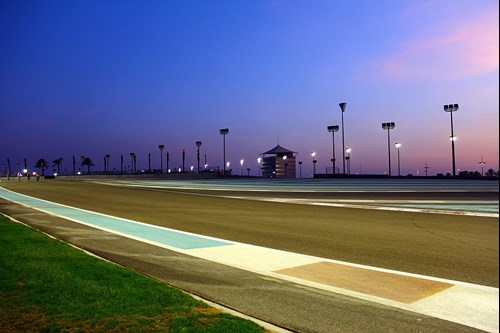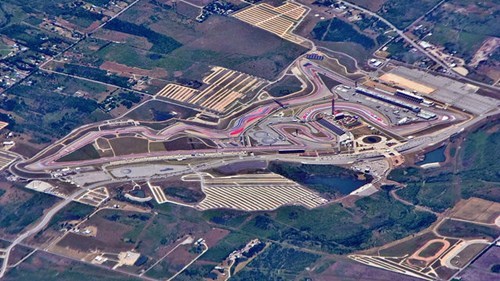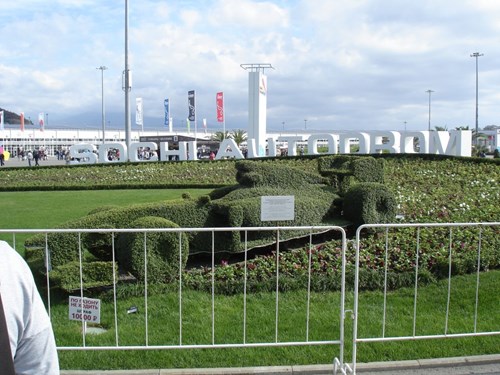A memorable Formula 1 season reached its conclusion in Abu Dhabi a few days ago with a host of talking points gripping the sport. From Lewis Hamilton’s dominance of the circuit, to Max Verstappen’s paddock meltdown in Brazil and the addition of new GPs to the calendar, hot topics abound and already attention is turning to Australia, 17 March. We spoke with Mario Zambas, Lecturer in BA (Hons) Stadium & Event Management at UCFB, who helped launch the inaugural Abu Dhabi GP in 2009, as well as the US and Russia GPs in 2012 and 2014 respectively…

Mario worked on the inaugural Abu Dhabi , US and Russia GPs
What are your thoughts on the 2018 F1 season?
I thought that it was a good fight for most of the season between Mercedes (Hamilton) and Ferrari (Vettel) but it could have been much closer if some strategies and decisions by Ferrari/Vettel had been better. It was a shame to see the end of Alonso’s F1 career although he hasn’t ruled out a comeback after IndyCar.
I thought that Verstappen has shown maturity and with a more competitive car will definitely challenge in the future. He is a lot like a young Lewis Hamilton, a natural born racer.
Can you tell us about your work in F1? What does it take to launch a GP?
Good question! I had three main roles; firstly, as IT Director at the Yas Marina Circuit in Abu Dhabi I was responsible for the IT delivery at the inaugural Etihad Airways F1GP in 2009 and the two subsequent races. I was responsible for ensuring that the technology –
infrastructure, networks, customer facing systems (ticketing, retail, access control etc.), internal systems (CRM, Finance, HR, intranet etc.), media centre, special electronics, business continuity, disaster recovery and race management systems were installed on time and were fit for purpose.

Yas Marina Circuit: the Abu Dhabi GP was launched in 2009
The activation of an F1 circuit requires great teamwork and massive effort by a great number of people to be successful and I had a fabulous team working with me. I was fortunate to have worked closely with the main contractor Aldar (building), Siemens (electronics) and Tilke (track design architect), as well as some of the agencies and Formula One Management (FOM) and the Federation Internationale de l’Automobile (FIA).
We had the honour of being presented to HRH Crown Prince Mohammed by my boss Khaldoon Al Mubarak, who you might also know is the Chairman of Manchester City Football Club.
At Circuit of the Americas in Texas I was recruited by Deloitte as a business consultant to assist with the implementation of a cloud based financial system and a venue/event management system. I also set up the Main Operations Centre (MOC) which acts as the communications hub for the venue during the F1 event.
I acted as the interface between the F1 track operations and the internal and external stakeholders, keeping the circuit operations teams/help desks, FBI, County Sherriff, traffic police, security services up-to-date with the minute-by-minute plan. (F1 runs on the Minute by Minute plan which details all of the track/off track related activities during the weekend).

Circuit of the Americas, Austin, Texas
In Sochi, I led a team of operations consultants and we were responsible for ensuring that the venue was prepped and ready for the F1GP.
This involved recruitment, implementing procedures, training and being the interface to FOM and the FIA and the International Olympic Committee (IOC).
We of course were building the circuit at the same time that Sochi was getting ready for the 2014 Winter/Paralympic games which was a challenge since the track went round the Olympic park venues.
How has the Abu Dhabi GP developed since you helped to launch the inaugural race in 2009?
Well this year’s final championship race was the 10th anniversary. The track has not changed since the original Tilke design and other than upgrades and maintenance the main systems are similar to what was implemented when I was there. Some of my team are still working there and we keep in touch which is nice.
What is changing in the sport, and what new trends and innovations can you see?
The sport is changing all the time. Liberty Media, the new rights owner knows that it has to appeal to a younger audience as the traditional audience – the white/middle-class/male/middle-aged audience is gradually disappearing. As technology changes on a daily basis and the younger generation’s sports consumption is becoming online/streamed/on demand, this is forcing the sport to change its appeal.

The Sochi Autodrom has hosted F1 GPs since 2014
Innovation on the technical side is huge – you might not be aware but a lot of innovation from F1 reaches our road cars – hybrid technology, fuel injection, energy recovery systems, aerodynamics (one of the most highly regarded car designers is Adrian Newey, whose background is in yacht design), carbon fibre technology etc. The engineers who work in F1 are some of the brightest guys around.
What is it like to work in F1, and what skills or traits do you need to succeed?
It is no different to any other event driven environment – you need first class communication skills, ability to project manage, leadership qualities, great teamwork skills and not be fussed about working all hours under the sun when necessary!
What advice would you give to students looking to work in the motorsport industry?
Put everything you have got into getting the best degree grade that you can. Treat it as a warm up to your working career. Make contacts, network, volunteer for event work if you can – the more that’s on your CV the more chance you have of landing the job that you want. They can always get in touch with me for advice etc.
The glamour side of the sport is fantastic but the truth is like all event related work it can be tiring and stressful, but the adrenaline rush gets you through!
















